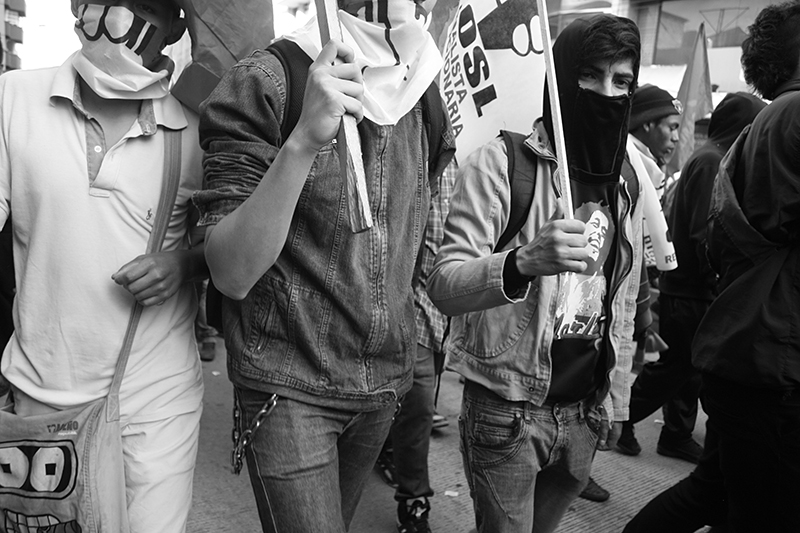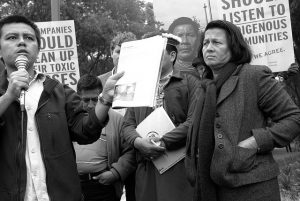Reflections on the Left Turn in Latin America
For those interested in LA politics and social movements, Jon Beasley-Murray has an interesting analysis piece in the latest Alternautus: Pyrrhic Victories: The Fall and Rise of the Left Turns. While I don’t agree with all of his analysis, it is worth the read. Here is one excerpt I found particularly interesting from his piece:
So let us take for granted that, with the “Left Turns” or “marea rosada,” the Latin American Left won, in some not insignificant sense. From Venezuela to Argentina, Bolivia to Brazil, it took over the levers of state power, which is nothing to be sniffed at. Taking advantage of this victory, as well as of other contingencies such as a favorable geopolitical climate, the exhaustion of their immediate enemies, and an unanticipated commodities boom, left-leaning governments of different stripes have had almost unprecedented freedom to experiment with a variety of progressive political, economic, and social solutions to some (at least) of the problems that have long ailed the region. They helped write new constitutions that threatened dramatically to improve participation and do away with some of the entrenched hierarchies of the creole republics. They ploughed money into diverse schemes to alleviate poverty, reduce inequality, and improve public services for those who most need them. And they presided over a series of reforms that increased the visibility and improved the social and legal rights of women, gays and lesbians, indigenous peoples, and others who have historically been marginalized and oppressed. In other words, there is no point denying that the Left Turns have indeed constituted an almost unprecedented achievement on the part of the Latin American Left, even at the same time we insist that they did not go far enough, that in some way they could never have gone far enough.
I think this point is an important one, and is something that I often find myself reminding friends of when I talk about the success of Ecuadorian social movements in re-imagining the 2008 constitution and the inclusion of ideas such as plurinationalidad, interculturalidad and the rights of Pachamama. Yes, they are still far from ideal, and remain problematic when it comes to translating them into local actions, but they are a shift into a new direction all the same.

Protests in Quito, Ecuador in 2014. (Image Credit: Gustavo Moya | Flickr)
The Challenge of Sovereignty
At the same time, Beasley-Murray points out, these victories of state capture–even if only partially and temporarily–can come at a high cost for social movements. Capturing the state and attempting to maintain political sovereignty in the face of external challenges to the new state power leads to new forms of anti-state politics as the social movements that helped new political actors capture the state find themselves either excluded by the new political elites–or worse–becoming direct targets of political repression by their former allies who now have their hands on the levers of state power.
This is effectively what happened with Indigenous and other left social movements in Ecuador once Correa began to consolidate his political power, which as Beasley-Murray notes, is the dark side of Left governance.
But equally, we can take it as given that nothing in these victories depended on anything like “hegemony.” And indeed, that the more that these regimes sought hegemony, the more frustrated they were bound to become. But the fact that they ultimately (or even initially) failed to become hegemonic is not in itself the marker or symptom, let alone the cause, of their downfall. Rather, defeat was already inscribed in the moment of their triumph: in the ways in which they were more or less forced, upon assuming state power, to turn against the movements that established them in that power, and to find that (reciprocally) those movements then sooner or later abandoned them and escaped the scene. Or in the ways in which, as a condition of gaining state sovereignty, they had to bear the burden of renewing or sustaining a social pact that was always fictive and perpetually in crisis, and as such they had to do the dirty work for which their bourgeois opponents were no longer fit for purpose. And perhaps most damagingly, at least in the short to medium turn, in the ways in which as a result they became increasingly dependent on the elusive powers of sovereignty itself, and so became fixated on charismatic leaders that soon outstayed their welcome and misread the true sources of whatever power they had indeed won.
This last point is important since, as he argues, part of what we have been seeing in South America (and I would extend this to other regions and social movements outside LA) are new manifestations of popular politics. Some of these forms do not sit easily within existing understandings and theories of power or politics, and thus they are often misread by political elites and commentators alike. And in the case of countries like Ecuador and Bolivia, we are seeing for the first time experiments in Indigenous leadership and important political experiments not driven entirely by the historical agenda of colonial (and mostly Spanish) elites.
And yet they exerted immense pressure upon political processes, not least on the fiction of a social pact upon which the political compact depended–in Venezuela quite literally, as the Caracazo exposed the threadbare nature of the “Pact of Punto Fijo,” but the impact of these various mobilizations was just as striking elsewhere. They forced a reimagining of the political and as such (and Hugo Chávez himself was one of the first to realize this) expressed a constituent power, a desire to re-found the political on new bases.
On Constituent Power
It is precisely these new forms of “constituent power,” a fancy political theory way of saying ‘the raw power of people put into action,’ which seems to me the most interesting and important recent dynamic driving global social movements. The various theories of constituent power are showing up in a variety of literature: from those focused on issue of sovereignty to new theories of radical democracy.
Sometimes these new movements are progressive in orientation, as in some examples from LA, but they can just as easily be authoritarian and regressive–as for example the rise of Donald Trump in US politics and related far-right and white supremacists groups that appear to be gaining steam. This same dynamic helped turn the “Brexit” vote from a “ha ha” joke into a stunning European wake up call about the growing influence of exclusionary forms of ethnic and racial nationalism.
I disagree with Beasley-Murray, however, when he argues that these failures of social movements capture of the state agenda signal a wider absence of politics:
But in each case, a kind of latency period followed the protests before any political organization or party could emerge or reconfigure themselves so as to capture this constituent energy, thus demonstrating that the mobilizations themselves were indeed not political in any meaningful sense of the term. It fell to the Left to re-cast them in political terms, by means of a constituent process that then created the social identities and actors upon which the new regimes could base their own legitimacy.
I think he mischaracterizes the constituent power dynamics inherent in social movements in two important ways.

Protests at 2011 Chevron Shareholder Meeting. (Image Credit: RAN | Flickr)
First, these social movements are clearly political, as his own analysis shows. To dismiss these movements as “not political” simply because they are not clearly aligned with official parties or organization is to impose an overly narrow and empirically questionable definition of politics or the political. The Occupy movement here in the US, and in its later incarnations (Occupy Central, etc.) proved that you can have widespread, popular political movements without needing formal political parties. Longevity of movements is a different issue that needs to be separate from the initial question of politics as such.
Secondly, to suggest that the Left in Latin America had to re-cast these social movements in “political terms, by means of a constituent process that then created the social identities and actors upon which the new regimes could base their own legitimacy,” ignores pre-existing forms of cultural and identity politics already in play.
In the case of Ecuador, some Indigenous political identities were being articulated through concepts like sumak kawsay and demands for plurinationalism long before the rise of the current Left movements in power. Rafael Correa and the AP in Ecuador did not have to reconstruct an Indigenous political identity post-facto coming to power. It was already there, and was an important factor in helping elect Correa in the first place. To suggest that these identities had to be constructed later for legitimacy is clearly false as a blanket political claim about the Latin American Left.
What is different is that the more vocal social movements–Indigenous, women and enviros–were by and large not incorporated into official forms of state sovereignty, and thus remained on the margins as sympathetic but agitating social forces–a dynamic that the author notes himself.
This largely independent status in relation to ruling political parties and organizations is key. This is precisely why some Indigenous groups considered certain party leaders from CONAIE and other federations traitors when they took cabinet or minister appointments under Correa, even while they officially pushed for more influence within the government. (The story with Indigenous parties in Ecuador is obviously much more complicated, but the nuances are beyond a short post.)
Some social movement leaders and activists who did join the Correa government early on, such as Monica Chuji or Alberto Acosta, found they could not last long in favor while being critical of the new government, and have since moved from inner-circle supporters to dissident critics.
This is also why Indigenous and left social movements in Ecuador (and across the Andes) continue to be targeted by police and military operations for challenging state development and resource extraction projects (i.e., Yasuni. etc.) pushed by the Correa government. A similar story exists for opposition to TIPNIS in Bolivia and other state development projects throughout the Andes and South America.
In fact, as Global Witness noted in a recent report, On Dangerous Ground, 2015 was the worst year on record for extra-judicial killings and assassinations of environmental and Indigenous rights activists. Many of those killed, such as Berta Cáceres, were actively opposing state “development” projects in Latin America, and more often than not government officials are implicated in their deaths.
Here Beasley-Murray’s reading of these political trends is a little closer to what I see happening as well, especially when he discusses new forms of biopolitics. However I would offer a slightly different analysis of the dynamics. For example, Beasley-Murray argues that:
In short, these [Caracazo, Cochabamba water wars, etc.] were revolts against a particular form of biopolitics. The regimes that followed the revolts then had to negotiate with this new biopolitical horizon, whether by confronting (or allying with) more expansive forms of extraction, by adopting ever more immanent modes of communication and governance that tended to bypass established institutions, or by promoting a drastic enlargement of the domain of political conceptualization, attributing rights for instance to the natural environment. In this context, the rise to prominence of a notion such as “buen vivir” as a political concept is a revenge on (but also revenge of) biopolitics, in that it is a recasting of the relationship between politics and life itself that would have been inconceivable in any preceding, populist, era.
At least in the case of buen vivir and the rights of Pachamama, these are important changes which I think can rightly be pointed to as having a biopolitical component, but the typical Marxian or Foucaultian reading–and this is true of Beasley-Murray’s reading–fails to grasp the deeper philosophical shifts taking place which not only reject neoliberalism (that much even the Marxists understand), but also challenge concepts which rely on anthropocentrism and humanism for their underlying logic.
It is not just populism that could not conceive of these new forms of biopolitics. It is the limits of our contemporary understandings of politics as such that blinds us to these new political horizons.
A New Bios, A New Polis
In this regard, Marxism is as much on the theoretical chopping block as capitalism.
Both require a static, manipulable and inanimate natural world from which to fashion their political utopias and extract labor and value, irrespective of questions of ownership and distribution. This is one of the reasons that ostensibly socialists or communists nations have equally abysmal environmental records when compared to free market, capitalist states.
By contrast, the trends driving a rethinking of the rights of Mother Earth (as in the Ecuadorian and Bolivian constitutions) and post-extractivist or post-petroleo political visions, aim at dismantling the political, philosophical and legal frameworks which both capitalism and socialism/communism presuppose. The Rights of Nature as a global social movement–to take just one example–is not just about adding another rights bearing subject to the ledger, but more fundamentally about redefining the core meanings of concepts such as political agency and subjectivity.
It is precisely for this reason that these movements have been difficult to co-opt by established political parties; the logic of these opposing worldviews are ultimately incommensurate, even if the rhetoric appears more fluid and manipulable. At the end of the day, you can’t simultaneously view a tree as sentient and alive and as x number of board feet to sell in the open market. Here action is the real marker of belief.
So while I agree these are new forms of biopolitics, they are not the bios or the polis that are traditionally conceived of by most political theorists. The problem is that these emerging social movement trends don’t lend themselves to easy characterizations and are still very much in flux.
In my own work I have been developing this line of argument through the term Earthbound people, which Bruno Latour first proposed in his Gifford Lectures, and developing a theory to better understand these new transnational social movements that are injecting innovative forms of cosmopolitical thinking onto the world stage. These are hybrid social movements fusing social and ecological justice issues with deeper ontological questioning of Western rationalism, and informed by a health dose of animist and Indigenous spiritual views and critiques of Modernity.
It is precisely these new social movements which I see as playing an important yet under-theorized role in many parts of the world today, including Latin America.
Despite some of my disagreements with how Beasley-Murray characterizes the “Left Turn” in Latin American in recent years–especially from the perspective of recent Ecuadorian social movements–I think he offers important insights that both scholars and activists of the left would do well to reflect on, as well as engaging with an important ongoing debate about the role of the state in relation to social movements and Left politics.


